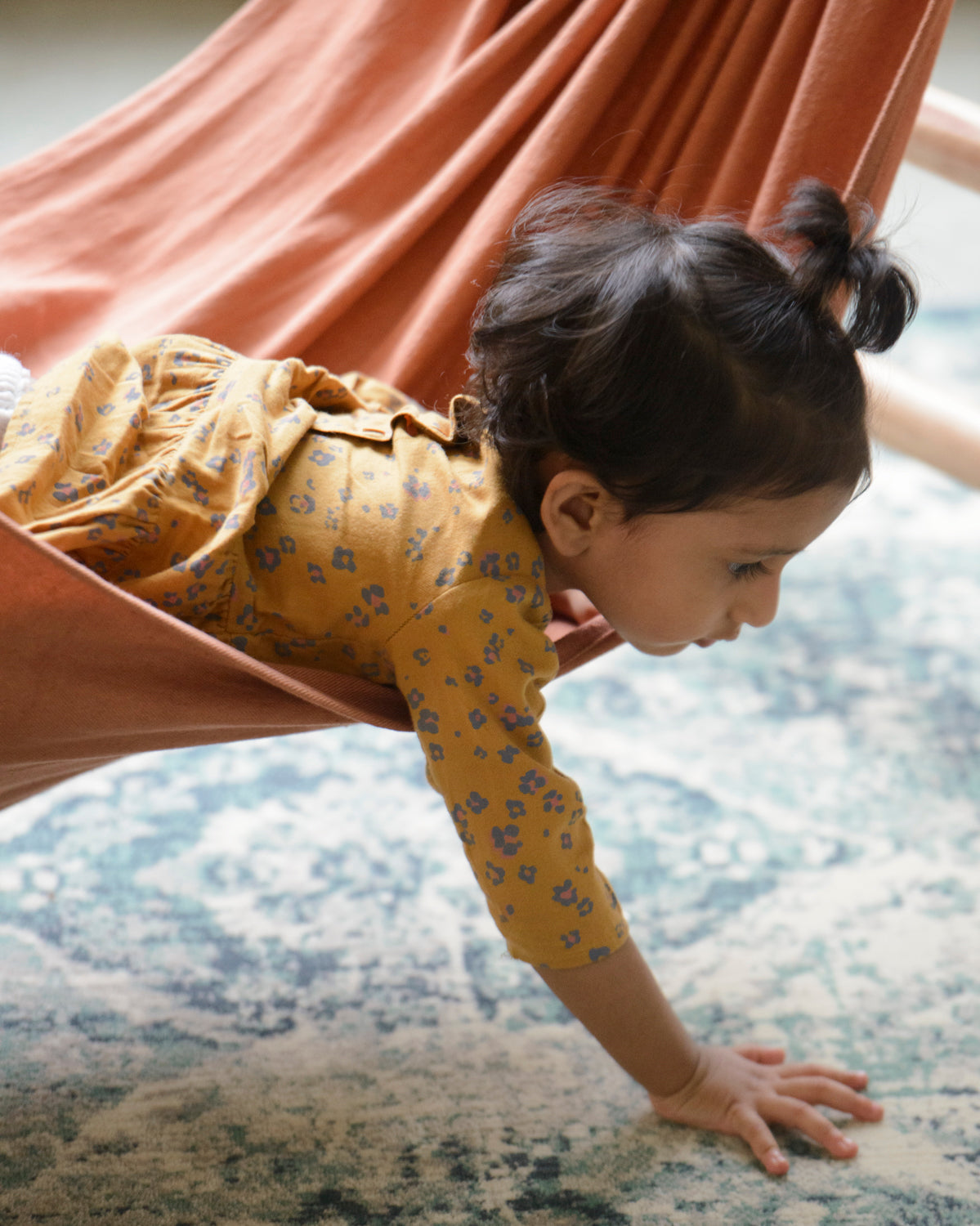
Ever seen a little baby fascinated by his hands? That’s him realising that they exist and can even be controlled in different ways. Babies will spend months just clenching and unclenching their fists, staring at amazement at the magic they are able to do on their own. No one taught them how to do this. And what joy they must get by mastering this extraordinary ability!
Then, they start reaching out to grab things as well; who hasn’t felt the joy of having a little baby grab onto an outstretched finger. They are able to do this only when given as many opportunities to do so. Sometimes something as simple as swaddling them up all the time might be denying them this chance.
Similarly, an older child would think herself the champion of the world when she is first able to stand up on her own. With wobbly knees and a bobbing torso, she’ll look around amazed, thinking “What great heights I have achieved! Aren’t I fantastic?” She might plonk down the very next second but she’ll know what it means to succeed on her own already. We’ve all had the urge to help… but might not this be depriving them of the sheer joy?
The Baby Schema
As doting parents and caregivers, our instinct is to help our little ones as much as we can. It’s a trick played well by nature -- those big eyes and oversized head, clumsy limbs, and chubby cheeks automatically draw us to being extra caring to little creatures of any species, and particularly of our own. The ‘baby schema’ that little ones possess ensures that they will always be the ones in charge in our homes.
This also translates into our tendency to lovingly help these tiny even ‘helpless’ humans at every turn. We might feel that this is exactly what’s needed. After all, every parent and caregiver wants their child to develop positively, to do all that she is expected to do and more, and also to do it soon. It's every parents’ hope that his or her child will be extraordinary. And they are! These little helpless creatures are innately extraordinary… and that is, even without our 'help' :)
Every child goes through several stages of movement -- from lying on their backs, rolling over, crawling, sitting, standing, walking, running, and climbing -- they take place in a progression that is naturally different for each little one. The one common feature is that every child will instinctively know when he is ready for the next step.
So, should parents step in?
Not much, say most experts. Children shouldn’t be forced to do anything they aren’t ready to do on their own. By asking them to jump ahead in the hopes that they’ll reach the next milestone just a little quicker, we might inadvertently stop our children from learning to learn.
Have you ever noticed yourself trying to prop up your toddler so she can look at the new gift from an uncle, or helped her into the walker their grandma got for them? You might be trying to teach your little one important skills, but to paraphrase Magda Gerber (student of Emmi Pikler), are you sure it isn’t stopping them from learning? Sometimes in our drive to be as caring as possible, we deny children the opportunity to learn on their own. Think back to the most basic motion of clenching one’s fist -- if a caregiver made a child do it, she would immediately be robbed of the feeling of achievement, hidden somewhere in her developing sense of self.
Instead, what we can and should do is remove any hindrances for our little bundles of sunshine. The outstretched finger is the perfect toy for a child who is able to clench his fists. Simply giving toddlers the freedom to explore is a great first step.
As children grow older, creating a safe environment that helps them push themselves at their own pace is the best thing we as caregivers can do. By setting up a safe space for the little ones at home and providing them with open-ended toys, time and space, we bring out the best in them, without pushing our own expectations onto them. Leave the budding gymnasts and mountaineers around a well-designed pikler triangle or climber and watch as they teach themselves everything they need to through adventurous play. Grasping, sitting up, supporting themselves, or climbing... a wonderful way to learn isn’t it?
This article is part of a series on adventurous play. Have a look at our Bloon Pikler Collection -
Inspired by Dr. Emmi Pikler’s Pikler Triangle - the Bloon Pikler brings to you a versatile and adaptable range of climbing frames and accessories designed to see a growing child through all their stages of development - giving them different levels of challenge, adventure, physical and imaginative play... playful furniture they never grow out of!




Leave a comment